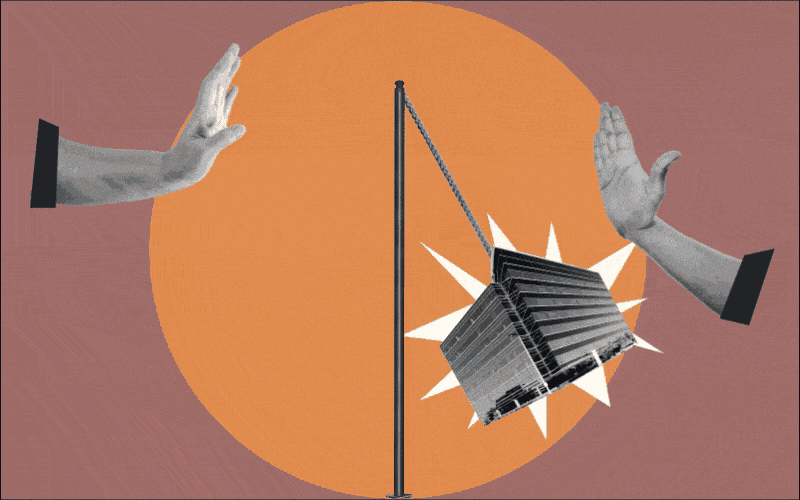Today I learned that a building can be so unwanted that the owner must pay the lender to accept a deed in lieu of foreclosure.
Let me explain.
Several commercial real estate professionals weighed in on last Thursday’s Daily Dirt about a developer’s request for tax breaks from Nassau County. Manhattan-based TKF Real Estate is seeking a tax reduction to buy a 37-percent-vacant office building at 1000 Woodbury Road from Scott Rechler’s RXR.
While the commenters generally agreed that it’s hard for industrial development agencies to dole out discretionary tax breaks fairly and efficiently, and that such subsidies essentially transfer wealth from taxpayers to landowners, the CRE pros made some interesting points.
One law firm partner, Scott Weinberg of McDermott Will & Emery, noted that because banks are only foreclosing on out-of-favor office buildings as a last resort, if owners don’t want to sink money into renovations to make a property viable, a stalemate can ensue.
In this scenario, neither the owner nor the lender wants the building. It’s worth less to the owner than the mortgage balance, and the lender doesn’t want to pay transfer taxes and other expenses to take it.
“Even if the borrower wants to simply walk away, the lender is under no obligation to take ownership of the property, and also does not want to spend money unnecessarily on property upkeep,” Weinberg noted. “The result of this is a big game of chicken where both the lender and borrower try to induce the other to do something they don’t want to do — all of which takes time, sometimes even years.”
If no deal is reached and the lender forecloses, that process can itself take years, even if the borrower does not contest the action. The courts are that slow.
“So while a tax break may not be ‘needed’ in a strict sense,” Weinberg concluded, “it may still be desirable to speed up a property’s recovery and upgrade.”
(Memo to the government: Speed up the courts and maybe IDAs won’t be asked to bail out so many buildings at taxpayers’ expense.)
What if the building owner stops making mortgage payments? Can he still collect rent while demanding the lender modify the loan? No, because lenders typically require that tenants pay into a “hard lockbox,” which in turn pays the mortgage.
If the loan is in default, any excess in the lockbox goes to the lender, either to pay down the loan or to hold as collateral. This “cash trap” increases the lender’s leverage in negotiations with the borrower.
What if an owner circumvents this by asking tenants to pay him directly? That’s a “bad boy” act that allows the lender to go after his personal assets. Not a good option for owners.
This is why owners sometimes can’t just hand over the keys, but have to pay lenders to take them.
But there are other solutions. An owner can, with the lender’s consent, sell the property for less than the mortgage balance, with the bank getting the proceeds and calling it a day.
That’s obviously preferable to taxpayers subsidizing purchases of distressed real estate. If I were on Nassau’s IDA, I would check in with Rechler (a Long Islander) and his lender to see where things stand on 1000 Woodbury Road before considering TKF’s request for tax breaks.
What we’re thinking about: City Council member Julie Menin’s “Safe Hotels Act” is a proposal being fought by hotel developers and owners, who see it as a thinly veiled attempt to erode the room-price advantage enjoyed by nonunion hotels. But about that bill name: What exactly is unsafe about hotels in New York City? Email me at eengquist@therealdeal.com.
A thing we’ve learned: A Google search uses 0.3 watt-hours of electricity, but a ChatGPT search uses nearly 3 watt-hours.
Elsewhere…
— Micah Lasher, who will represent the Upper West Side in the Assembly come January, chimed in on a social-media debate about why young families are leaving progressive cities. “It’s the housing shortage, stupid,” he tweeted. There was general agreement on the thread that Nimbyism is the main problem, but disagreement about whether progressives are to blame for it. A thought: Can people who oppose new housing really be called progressive? Merriam-Webster defines conservative as “tending or disposed to maintain existing views, conditions, or institutions.”
— Conservationists previously estimated that 365 million to 988 million birds die annually in the U.S. from flying into buildings. But that was based on counts of dead birds at the base of buildings. Factoring in a new study showing that birds who initially survive collisions often die later from their injuries, the estimated death toll is well over 1 billion, amNewYork reported. Bird-safe glass can reduce the carnage. So can decals, but only if they are placed on the outside of windows.
Closing time
Residential: The priciest residential sale Wednesday was $6.4 million for Unit 22 at 15 West 96th Street. The Upper West Side condo is a new development. The Agency’s Shane Boyle was the listing agent for the unit.
Commercial: The largest commercial sale of the day was $58.5 million for the Chocolate Factory Lofts at 275 Park Avenue. Fairstead and Meadow Partners sold the building to Thor Equities for nearly $9 million less than the previous sale price, in 2019.
New to the Market: The highest price for a residential property hitting the market was $9.5 million for co-op Unit 12E at 550 Park Avenue in Lenox Hill. Douglas Elliman reportedly has the listing. — Joseph Jungermann
